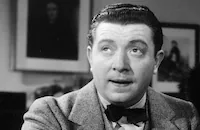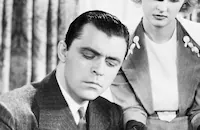Parachute Jumper

Brief Synopsis
Cast & Crew
Alfred E. Green
Douglas Fairbanks
Bette Davis
Frank Mchugh
Claire Dodd
Leo Carrillo
Film Details
Technical Specs

Synopsis
Bill Keller and Toodles Cooper arrive in New York after they leave the United States Marines, expecting to find jobs as commercial pilots. Learning that the company which hired them has since gone out of business, they join the ranks of the unemployed. Down to his last fifty cents, Bill meets Patrica Kent, known as Alabama for her southern accent, and buys her breakfast with the remains of his money. He suggests that she join him and Toodles in their apartment, and after she is convinced that his intentions are honorable, she agrees. Bill tries his hand at parachute jumping and is nearly killed when he lands on the railroad tracks in front of an oncoming train. After promising Alabama that he will never attempt the stunt again, he overhears two chauffeurs talking about a woman, Mrs. Newberry, who needs an elegant chauffeur. He spends the money he earned from jumping on a new uniform and gets the job. Mrs. Newberry is being kept by Kurt Weber, a bootlegger. He discovers her in compromising circumstances with Bill but, impressed by Bill's coolness in the situation, he kicks Mrs. Newberry out of the apartment and offers Bill a position as his bodyguard. Hiding outside the office, Bill overhears Alabama flirting with Weber in an attempt to get a job as his secretary. Bill thinks that she is fickle and they quarrel. Later, during a routine smuggling flight into Canada, Bill and Toodles are chased by the Border Patrol. Believing them to be hijackers, Bill shoots down the airplanes. Alabama saves Bill from a frame-up by Weber's henchman Steve and convinces him to resign. Bill agrees to help Weber one more time, but when he discovers that they have unknowingly been smuggling narcotics along with the alcohol, Bill crashes his own airplane, making it look as if Weber had been flying with Bill as his captive. Toodles reinlists in the Marines and after obtaining Alabama's consent to marry him, Bill reinlists too.

Director
Alfred E. Green
Cast

Douglas Fairbanks

Bette Davis

Frank Mchugh

Claire Dodd

Leo Carrillo

Harold Huber
Thomas E. Jackson

Sheila Terry
George Pat Collins
Harold Healy
Frederick Munier
Reginald Barlow
Pat O'malley

Walter Miller

Lyle Talbot
Crew

Videos
Movie Clip



Trailer
Film Details
Technical Specs

Articles
Parachute Jumper -
One has to believe that it wasn't Parachute Jumper itself she so disliked as the series of girlfriend roles she saw staring her in the face at Warner Brothers if she didn't fight back. Fight back she did, for years behind the scenes and, eventually, in court. Looking back at her career, we're glad she did. Like all great movie stars, she was able to make her best roles seem facets of a strong personality. She was never conventionally beautiful or sexy, but her stormy power, openness of emotion and largeness of gesture made her one of Hollywood's pioneering modern women, even in period costumes. Her memorable roles all are of agitated women - high-strung, nervous, impassioned, chain-smoking, eschewing languor for jerky, impulsive moves.
Her life was a series of wars waged against a world run by hard men. Uncompromising, unplacating, intense, she was a stranger to indifference. Like her indefatigable platinum-haired working girls of the early '30s, Davis kept pushing with her trademark double-barreled temperament until she got better roles. She didn't back away from playing disagreeable women, or even playing older. Davis won an Oscar® for the now forgotten Dangerous (1935) as an actress who backs away from wrecking two marriages. She won a second Oscar® for Jezebel (1938), partly, one suspects, because her sassy character, who shocks 1850 New Orleans by showing up for a cotillion in a scarlet dress, reforms a bit at the end. Davis claimed that both were consolation prizes for being passed over for her more scorching and far more memorable portrayal of a spitfire living by her wits in Of Human Bondage (1934).
She complained that Parachute Jumper director Alfred E. Green (who also directed Dangerous) had an infantile sense of humor. She also began an ongoing series of complaints to Jack Warner that the material offered her was too insipid. It may have begun when she heard how unconvincing she sounded with the Southern accent assigned her as an unemployed stenographer nicknamed Alabama. That being said, while nobody would argue that Parachute Jumper is anywhere near a period classic, it's got enough snappily-paced, honestly-earned entertainment value to achieve liftoff. Davis saw quickly that Warner's was a man's studio, with far more meaty roles being handed out to men than women. This outing clearly belongs to Fairbanks, and its title is literal.
He and Frank McHugh play buddies demobilized from flying duty with the U.S. Marines, unable to find work in Depression Era Manhattan. In a time when most Americans had never been in a plane, and flying was still new and exciting, Parachute Jumper is filled aerial sequences, starting when penniless Fairbanks suits up at a carnival act catering to audiences watching parachute jumps. Not only that. His number involves donning a chute in one plane, walking across its wing to another hovering nearby, then grabbing a strut of the second plane, hopping aboard it, and doing his parachute jump from it. Having met Davis's unemployed steno, and invited her to move in with him and McHugh to save expenses, he returns flush with $75 for his jump. But the feast for which Davis and McHugh set their table doesn't happen. Fairbanks spent the money on a chauffeur's uniform for a new job, ferrying a soignée divorcee (Claire Dodd, jagged with worldliness) around in the Rolls Royce her gangster boyfriend has provided for her.
One bit of hopscotch later, and he's working for the gangster, Leo Carrillo (pre-Pancho, of Cisco Kid [1950] fame). When he isn't armed muscle, he and McHugh (I've resisted calling McHugh by his character's name - Toodles) are flying blind to Canada at night, hauling back bootleg booze. Not that Alabama is idle - or wants to be. By the merest of coincidences, she's hired as the gangster's receptionist - a sore point with Fairbanks' flier. Not only is she unapologetic. She extricates him from a murder frame-up. Fairbanks's Bill Keller finally wises up, with the help of U.S. Border Patrol planes giving armed chase. It was a good way to squeeze in the daredevil flying sequences audiences craved, and the film climaxes with even more airborne acrobatics. The action works better than the dialogue, which reminds us that sound was even newer to film than flying and was still tied to stage material, where things like subtext were still largely uncharted territory.
Fairbanks was probably as good a man as any to dish out the excitement. He obviously inherited his father's athleticism, but he's taller and thinner and in better shape. There's also a rakish insouciance he projects along with the physicality that makes his heroes sophisticated as well as dashing, even as a rough and ready type. It's a performance that taps into the reason why movies of the '30s were more central to American life than in any other decade. Americans knew they were in a decade-long Depression. Many of them were ground down by poverty, malnutrition and pride drained away by enforced idleness. What Fairbanks projected with many another actors was a sense that you don't let yourself get whipped, that you not only met life head-on, but met it with a sense of style. Ditto for the other Hollywood archetype - the spunky, spirited working girl convincingly embodied by Davis.
These people get knocked down, but don't stay down, and this was the message they transmitted to Americans week after week at the movies. In his lesser way, McHugh's character projects the same self-reliance (in an era of great screen tough guys, however, Carrillo just doesn't project enough menace). Although it never pulls a long face, Parachute Jumper is a film that empathizes with its audiences and their Depression woes. When Fairbanks meets broke, hungry Davis on a park bench, and offers to buy her a plate of ham and eggs with his last half dollar, he steals sugar cubes as they exit the restaurant. She has lifted a bottle of ketchup. Comparing hauls, they laugh about it. We're never far from the bleak realities of joblessness and homelessness (sound familiar?). Discovering he's been used as a drug-runner turns Fairbanks's Bill against a life of crime. Bootlegging, which most of America laughed at during Prohibition, didn't.
Meanwhile the Davis express roared on, if not always smoothly. She excelled as cold, destructive women in The Letter (1940) and The Little Foxes (1941). She shone as romantic heroines in Dark Victory (1939) and Now, Voyager (1942). When her career seemed about to flame out at the end of the 1940s, she came back in her greatest role, Margo Channing, an actress as lioness at bay, in All About Eve (1950). A decade later, when her career seemed about to go into eclipse again, What Ever Happened to Baby Jane? gave her new life. She hung on her wall the gold records awarded to the pop song hit, Bette Davis Eyes. In 1987, two years before her death from breast cancer, she appeared alongside another screen legend, Lillian Gish, in The Whales of August, a minor-key but beautifully modulated study of two aged sisters sharing a house in Maine. She even had the satisfaction, late in life, of coming up with an unbeatable exit line when she told Barbara Walters, "I am just too much."
By Jay Carr

Parachute Jumper -
Quotes
Trivia
In 1962, producer-director Robert Aldrich was preparing the prologue to What Ever Happened to Baby Jane? He chose a scene from Parachute Jumper and Ex-Lady (1933) to document the fact that the young Jane was a flop as a movie star.
Notes
Rian James's original story was entitled "Some Call It Love." Hollywood Reporter notes that director Al Green replaced William Dieterle when the latter's prior picture was delayed. According to production records included in the file on the film in the AMPAS Library, the film was shot in twenty-seven days for a total cost of $206,000. Modern sources note that a clip of the film appears in Bette Davis' 1962 film Whatever Happened to Baby Jane."















